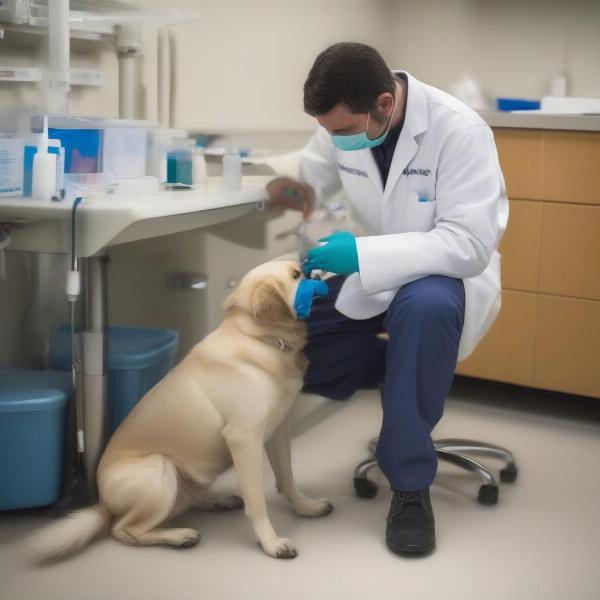Rabies is a deadly viral disease that affects the central nervous system of mammals, including dogs. While vaccination significantly reduces the risk, the question “if dog is vaccinated can it get rabies” is a valid one, and the answer requires a nuanced understanding of rabies and its prevention. This article will explore the efficacy of rabies vaccines, the possibility of infection in vaccinated dogs, and the crucial steps to take to protect your canine companion.
Understanding Rabies Vaccination
 Rabies vaccine for dogs
Rabies vaccine for dogs
Rabies vaccines work by introducing a small amount of inactivated or modified-live rabies virus into the dog’s system. This stimulates the dog’s immune system to produce antibodies against the virus, providing immunity. The effectiveness of these vaccines is generally very high.
Breakthrough Infections: A Rare Possibility
While rare, a vaccinated dog can still contract rabies in what’s known as a “breakthrough infection”. This can occur for several reasons, including:
- Vaccine failure: Although rare, sometimes the vaccine doesn’t stimulate a sufficient immune response in the dog. This can be due to individual variations in the dog’s immune system or issues with the vaccine itself, such as improper storage or administration.
- Exposure to a highly potent strain: In some cases, a vaccinated dog might be exposed to an exceptionally high dose of the rabies virus, overwhelming its existing immunity.
- Waning immunity: The immunity provided by rabies vaccines isn’t lifelong. Booster shots are necessary to maintain adequate protection. If a dog is overdue for a booster, its immunity might have waned, increasing the risk of infection.
What to Do If Your Vaccinated Dog is Bitten
Even if your dog is vaccinated, any bite from a wild animal or a dog suspected of having rabies should be treated as a potential rabies exposure. Immediate action is crucial:
- Wash the wound thoroughly: Clean the bite wound with soap and water for at least 15 minutes. This can help remove some of the virus.
- Contact your veterinarian immediately: Your vet will assess the situation and recommend the appropriate course of action. This might include a booster rabies vaccine or, in rare cases, rabies immunoglobulin.
- Quarantine: Depending on local regulations and the circumstances of the bite, your dog might need to be quarantined for a period to observe for any signs of rabies.
Protecting Your Dog: Beyond Vaccination
Vaccination is the cornerstone of rabies prevention, but it’s not the only step. Other important measures include:
- Avoiding contact with wildlife: Discourage your dog from interacting with wild animals, especially those known to be rabies carriers, such as raccoons, skunks, bats, and foxes.
- Leash laws: Keep your dog on a leash when in public areas to prevent unwanted interactions with other animals.
- Reporting suspected rabies cases: If you encounter a wild animal or a dog exhibiting signs of rabies, report it to your local animal control authorities immediately.
Conclusion
While rabies vaccination offers highly effective protection, it’s not a guarantee of complete immunity. Understanding the possibility of breakthrough infections and taking appropriate precautions, such as avoiding contact with wildlife and seeking immediate veterinary care after potential exposure, are crucial for keeping your vaccinated dog safe from rabies. By combining vaccination with responsible pet ownership practices, you can significantly minimize the risk of this devastating disease.
FAQs
- How often should my dog receive a rabies vaccine? Initial vaccination schedules vary, but booster shots are typically required every one to three years, depending on local regulations and the type of vaccine used.
- What are the symptoms of rabies in dogs? Symptoms can include behavioral changes (aggression, restlessness, anxiety), excessive salivation, difficulty swallowing, paralysis, and seizures.
- Can humans get rabies from a vaccinated dog? The risk of contracting rabies from a vaccinated dog is extremely low, but any bite from a potentially exposed animal should be treated seriously. Seek immediate medical attention.
- Are there any side effects of the rabies vaccine? Mild side effects, such as soreness at the injection site, lethargy, and decreased appetite, can occur. Severe allergic reactions are rare but possible.
- Is rabies always fatal in dogs? Once clinical signs of rabies appear, the disease is almost always fatal.
- What should I do if I see a stray animal that I suspect has rabies? Do not approach the animal. Contact your local animal control or public health department immediately to report the sighting.
- Are there home remedies for rabies? There are no effective home remedies for rabies. Veterinary care is essential.
Related Articles
About ILM Dog
ILM Dog is your trusted resource for expert dog care advice, providing comprehensive guidance on breeds, health, training, nutrition, grooming, and more. We offer practical, up-to-date information to help dog owners worldwide provide the best possible care for their furry companions. Whether you’re a new dog owner or an experienced enthusiast, our expert articles empower you with the knowledge and resources you need. From choosing the right breed to understanding complex health issues, we are committed to helping you build a strong, loving bond with your dog. Contact us at [email protected] or +44 20-3965-8624 for more information.